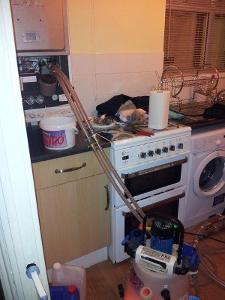Alternatively, if you want to detect a water leak in your home, you can check your water usage. If it has gone up significantly without reason, then this could be a leak. You can also take a meter reading and wait two hours ensuring not to use any water and take another meter reading. If your usage has increased, this indicates a leak.
Emergency Plumbers
& Boiler repairs
Call Our Experts PlumbersToday
Boasting over three decades in the industry, you can count on Abbotts Maintenance Team ™ to provide a multitude of high-quality heating and plumbing services in the region.
Abbotts Maintenance Team ™ have a wealth of expertise when it comes to all aspect of boiler repair and servicing. What's more, our Gas Safe engineers can replace your old boiler with a new energy saving model to reduce your fuel bills.
Skilled Tradesmen You Can Trust
Our qualified engineers always treat your home with the same level of care and respect that we would show our own homes. Abbotts Maintenance use dust sheets and leave your home clean and tidy, no matter the size of the job that's why we have been given .
Welcome to Abbotts Maintenance
Best Rated Plumbing Company 2019
If you need a local Emergency Plumber WhatsApp us today!!
At Abbotts Maintenance we aim to provide the highest standard of care to your home or business throughout London and Hertfordshire. We offer a no call out charge, 24hr emergency plumbers, boiler servicing, boiler repairs, central heating upgrades and power flushing.
Over the last 35 years we have been called out to all sorts of plumbing leaks, overflowing ball valves, leaking boilers, radiator leaks, dripping taps, boiler repairs, hot water issues, megaflo units, frozen pipes, bust pipes and water tank leaks.
If it is a new installation to a simple repair we are the top rated company in London and Hertfordshire.
If you need an emergency plumber we can get to you fast, all of our boiler repair engineers and plumbers in Borehamwood carry a large supply of spares to fix most problems. Below is some of the things our plumbers in Borehamwood can do for you.
Frequently Asked Pumbing & Heating Question
Emergency Plumbers & Boiler Repairs
Perhaps something most homes have encountered is the drip, drip, drip from a tap.
This can happen for a variety of reasons such as general wear and tear, a build up of debris
or when someone doesn’t turn the tap tight enough. It can even leak if someone over-tightens the
valve as it can lead to damage to the washer in the tap.
If you have a leaking tap, then it is wise to inspect the tap to determine the cause. Firstly,
switch off the water supply through an isolator valve or the stopcock. Then if you feel comfortable to do so,
open up the tap and inspect the washer.
You may notice that it has a build-up of debris which you can clean away.
Alternatively, the washer may have damage, and it is time for a replacement.
Only replace the washer if you feel comfortable to do so. If you don’t,
a competent handyman or plumber will be happy to assist.
Another common water leak is through a leaking radiator. A leaking radiator can cause significant damage to your floor,
ceiling and even wiring, so it is vital to fix it right away.
A water leak in the radiator could be from a number of different causes such as a leaking valve or valve spindle. Alternatively,
it may be leaking because of corrosion or pipe coupling.
Most of the fixes for a leaking radiator will require draining the system and refilling it. Furthermore,
the components of a radiator are relatively fiddly and can be difficult to master. For a leak in the radiator, determine where you think the leak is coming from,
then turn off your water supply and then it is usually best to call a plumber to resolve the issue for you.
If you spot a leak from a plastic/PVC water pipe joint, then the good news is that you may be able to fix the issue yourself. Remember, water can travel a long way before it drips as a leak, so you need to make sure you know exactly which joint the leak is coming from. Start by drying the area thoroughly and working out exactly where the water is coming from and whether it is the pipe or water pipe joint that is leaking.
Once you know the source of the leak, turn off the water for the affected area, or turn off the water at the mains supply if that is easiest.
Then get to work in fixing a leak. If you feel competent, remove and replace the affected section of the pipe. However, this may require cutting tools and equipment you may not have. Alternatively, you can make an easy temporary fix using rubber or silicone repair tape which is quick and easy to use. Repair epoxy can be even easier to use around plastic water pipe joint leaks, and it can mould to fit the shape of the joint.
If you have a leaking plastic water pipe, then the process is much the same as how to fix a leaking plastic water pipe joint. First make sure you know exactly where the leak is coming from, turn off the water supply and then either replace the affected water pipe or use a quick fix such as tape and epoxy.
Alternatively, for a super quick fix, you can use a rubber and hose clamp to give you some time before you can call a plumber out to make the fix.
Vaillant boiler problems and fault codes
Mass flow sensor not connected/disconnected,
plug not connected or incorrectly connected or an issue with its operation.
Mass flow sensor faulty, filter below venturi filter cap wet or blocked, gas flow pressure too low.
No or too little gas supply pressure, gas valve closed.
Mass flow sensor not connected/disconnected,
plug not connected or incorrectly connected or an issue with its operation.
Interruption/short circuit of water pressure sensor, interruption/short circuit to GND in supply line to water pressure sensor or water pressure sensor defective.
Water pressure sensor and/or pump defective, air in heating installation, too low water pressure in boiler; check adjustable bypass, connect external expansion vessel to return.
Ideal Logic, Icos & Isar Boiler fault Codes
The problem
If your heating system doesn’t have enough water, this fault can occur as its pressure could become low.
The solution
It is usually possible for you to fix this issue yourself by topping up your boiler’s water pressure to 1.5 using the in-built in filling loop. If you’re still facing issues, contact a Gas Safe registered engineer.
The problem
This usually means that there has been a flame loss during operation. This issue could be caused by deeper system errors such as incorrect gas pressure, an issue with your flue, a faulty gas valve, an incorrect adjustment of a valve or a fan fault.
The solution
Firstly, check other gas appliances and you could try to reset your boiler. This fault typically occurs with older boilers and low-efficiency systems, so it may be worth considering getting a new boiler installed.
The problem
This fault is caused by a loose or damaged fan. This issue could be related to deeper problems such as loose or damaged connections, water damage from a boiler leak, a fault with the air pressure switch or a problem with the printed circuit board.
The solution
This fault will require the help of a qualified engineer. As the issue can stem from a range of different causes, costs can vary.
The problem
The F4 fault code tends to signify a problem with your boiler’s flow thermistor or an issue with its operation. The fault will typically be related to circulation issues.
The solution
This fault will require a call out to a Gas Safe registered engineer.
The problem
This refers to a fault in the return thermistor or its operation. related to a faulty NTC return thermistor, a damaged connection, a differential in temperature that’s too high between the flow/return thermistors, or a faulty printed circuit board.
The solution
This fault will require a call out to a Gas Safe registered engineer.
The problem
Your boiler takes resistance readings which are then sent to the printed circuit board and if the temperature reading is too low or too high, the boiler will cease to work as a safety precaution and display a fault code.
The solution
Reset your boiler. If this doesn’t help, you should then contact a qualified engineer. Overheating is generally an issue that happens with older, less efficient boilers, so it may be worth investing in a new heating system.
The problem
Your boiler has ‘locked out’ as a safety precaution. The cause behind this will need to be identified.
The solution
Reset your boiler. If there’s rumbling coming from the system, this suggests your condensate pipe is blocked or that there is an issue with your flue. This requires a call out from a qualified engineer.
The problem
This fault code typically indicates that someone has changed the printed circuit board (PCB) and used the wrong boiler chip card (BCC).
The solution
This requires a call out from a qualified engineer.
The problem
Like L1, this code could indicate that the temperature on your resistance reading is too high.
The solution
Check your system’s pressure reading, you could also bleed your radiators to see if this helps. If not, we recommend contacting a Gas Safe registered engineers as the overheating could be a result of a deeper issue with your boiler’s pump or dry fire stat.
The problem
Your boiler may have ‘locked out’ as a safety precaution. The cause of this will need to be addressed.
The solution
Check that other gas appliances in your home are working, if so, we recommend that you then reset your boiler. If your boiler is rumbling, there could be a blockage in your condensate pipe. Contact a qualified engineer to fix the issue.
The problem
This could occur if someone may have reset the boiler 5 times in 15 minutes.
The solution
Turn off the boiler’s power at the fuse spur, then turn it back on again. If the issue continues, contact a qualified engineer.
The problem
This usually happens when your flame comes on before your gas.
The solution
Reset your boiler. If the boiler still fails to operate and your system is still covered by your warranty, you could contact your manufacturer for assistance.
Perhaps something most homes have encountered is the drip, drip, drip from a tap. This can happen for a variety of reasons such as general wear and tear, a build up of debris or when someone doesn’t turn the tap tight enough. It can even leak if someone over-tightens the valve as it can lead to damage to the washer in the tap. If you have a leaking tap, then it is wise to inspect the tap to determine the cause. Firstly, switch off the water supply through an isolator valve or the stopcock. Then if you feel comfortable to do so, open up the tap and inspect the washer. You may notice that it has a build-up of debris which you can clean away. Alternatively, the washer may have damage, and it is time for a replacement. Only replace the washer if you feel comfortable to do so. If you don’t, a competent handyman or plumber will be happy to assist.
Another common water leak is through a leaking radiator. A leaking radiator can cause significant damage to your floor, ceiling and even wiring, so it is vital to fix it right away. A water leak in the radiator could be from a number of different causes such as a leaking valve or valve spindle. Alternatively, it may be leaking because of corrosion or pipe coupling. Most of the fixes for a leaking radiator will require draining the system and refilling it. Furthermore, the components of a radiator are relatively fiddly and can be difficult to master. For a leak in the radiator, determine where you think the leak is coming from, then turn off your water supply and then it is usually best to call a plumber to resolve the issue for you.
If you spot a leak from a plastic/PVC water pipe joint, then the good news is that you may be able to fix the issue yourself. Remember, water can travel a long way before it drips as a leak, so you need to make sure you know exactly which joint the leak is coming from. Start by drying the area thoroughly and working out exactly where the water is coming from and whether it is the pipe or water pipe joint that is leaking. Once you know the source of the leak, turn off the water for the affected area, or turn off the water at the mains supply if that is easiest. Then get to work in fixing a leak. If you feel competent, remove and replace the affected section of the pipe. However, this may require cutting tools and equipment you may not have. Alternatively, you can make an easy temporary fix using rubber or silicone repair tape which is quick and easy to use. Repair epoxy can be even easier to use around plastic water pipe joint leaks, and it can mould to fit the shape of the joint.
If you have a leaking plastic water pipe, then the process is much the same as how to fix a leaking plastic water pipe joint. First make sure you know exactly where the leak is coming from, turn off the water supply and then either replace the affected water pipe or use a quick fix such as tape and epoxy. Alternatively, for a super quick fix, you can use a rubber and hose clamp to give you some time before you can call a plumber out to make the fix.
Mass flow sensor not connected/disconnected, plug not connected or incorrectly connected or an issue with its operation.
Mass flow sensor faulty, filter below venturi filter cap wet or blocked, gas flow pressure too low.
No or too little gas supply pressure, gas valve closed.
Mass flow sensor not connected/disconnected, plug not connected or incorrectly connected or an issue with its operation.
Interruption/short circuit of water pressure sensor, interruption/short circuit to GND in supply line to water pressure sensor or water pressure sensor defective.
Water pressure sensor and/or pump defective, air in heating installation, too low water pressure in boiler; check adjustable bypass, connect external expansion vessel to return.
The problem If your heating system doesn’t have enough water, this fault can occur as its pressure could become low. The solution It is usually possible for you to fix this issue yourself by topping up your boiler’s water pressure to 1.5 using the in-built in filling loop. If you’re still facing issues, contact a Gas Safe registered engineer.
The problem This usually means that there has been a flame loss during operation. This issue could be caused by deeper system errors such as incorrect gas pressure, an issue with your flue, a faulty gas valve, an incorrect adjustment of a valve or a fan fault. The solution Firstly, check other gas appliances and you could try to reset your boiler. This fault typically occurs with older boilers and low-efficiency systems, so it may be worth considering getting a new boiler installed.
The problem This fault is caused by a loose or damaged fan. This issue could be related to deeper problems such as loose or damaged connections, water damage from a boiler leak, a fault with the air pressure switch or a problem with the printed circuit board. The solution This fault will require the help of a qualified engineer. As the issue can stem from a range of different causes, costs can vary.
The problem The F4 fault code tends to signify a problem with your boiler’s flow thermistor or an issue with its operation. The fault will typically be related to circulation issues. The solution This fault will require a call out to a Gas Safe registered engineer.
The problem This refers to a fault in the return thermistor or its operation. related to a faulty NTC return thermistor, a damaged connection, a differential in temperature that’s too high between the flow/return thermistors, or a faulty printed circuit board. The solution This fault will require a call out to a Gas Safe registered engineer.
The problem Your boiler takes resistance readings which are then sent to the printed circuit board and if the temperature reading is too low or too high, the boiler will cease to work as a safety precaution and display a fault code. The solution Reset your boiler. If this doesn’t help, you should then contact a qualified engineer. Overheating is generally an issue that happens with older, less efficient boilers, so it may be worth investing in a new heating system.
The problem Your boiler has ‘locked out’ as a safety precaution. The cause behind this will need to be identified. The solution Reset your boiler. If there’s rumbling coming from the system, this suggests your condensate pipe is blocked or that there is an issue with your flue. This requires a call out from a qualified engineer.
The problem This fault code typically indicates that someone has changed the printed circuit board (PCB) and used the wrong boiler chip card (BCC). The solution This requires a call out from a qualified engineer.
The problem Like L1, this code could indicate that the temperature on your resistance reading is too high. The solution Check your system’s pressure reading, you could also bleed your radiators to see if this helps. If not, we recommend contacting a Gas Safe registered engineers as the overheating could be a result of a deeper issue with your boiler’s pump or dry fire stat.
The problem Your boiler may have ‘locked out’ as a safety precaution. The cause of this will need to be addressed. The solution Check that other gas appliances in your home are working, if so, we recommend that you then reset your boiler. If your boiler is rumbling, there could be a blockage in your condensate pipe. Contact a qualified engineer to fix the issue.
The problem This could occur if someone may have reset the boiler 5 times in 15 minutes. The solution Turn off the boiler’s power at the fuse spur, then turn it back on again. If the issue continues, contact a qualified engineer.
The problem This usually happens when your flame comes on before your gas. The solution Reset your boiler. If the boiler still fails to operate and your system is still covered by your warranty, you could contact your manufacturer for assistance.
Worcester Bosch Errors fault codes:
Cause code: 362
Reset type: Reset button
Possible cause: Incorrect HCM fitted
Cause code: 233
Reset type: Reset button
Possible cause: Problem with the code plug (faulty or not connected)
Cause code: 222
Reset type: Reset button
Possible cause: Flow sensor shorted or damaged
Cause code: 223
Reset type: Reset button
Possible cause: Flow sensor disconnected or damaged
Cause code: 218
Reset type: Reset button
Possible cause: Primary flow sensor overheated
Cause code: 332
Reset type: Reset button
Possible cause: Primary flow sensor overheated
Cause code: 219 Cause code: 220 Cause code: 221 Cause code: 224
Reset type: Reset button
Possible cause: The main heat exchanger has overheated. Maximum temperature 105°C
Maximum temperature sensor on the main heat exchanger has failed
Maximum temperature sensor on the main heat exchanger has not been recognised
Flue gas thermostat overheat
No flame detected after ignition Cause code: 227
Reset type: Reset button
Possible cause: Failure of four ignition attempts. The boiler waits 30 seconds before another attempt is made
Loss of flame signal during operation Cause code: 229
Reset type: Reset button
Possible cause: An established flame has been extinguished. This could be caused by: – Moisture in the sump, due to a blocked sump/condensate trap – A strong wind into the flue
Gas valve error Cause code: 234
Reset type: Reset button
Possible cause: Gas valve coil disconnected
Ignition timing error
Cause code: 261
Reset type: Reset button
Possible cause: Flame not established during the first 4 seconds ignition period
✔ Central heating installations
✔ Underfloor heating repairs
✔ Leaking radiator valves
✔ Emergency Plumbers
✔ Leaking toilets
✔ Boiler service & maintenance
✔ Boiler breakdowns
✔ Local Plumbers
✔ Leaking boilers
✔ Leaking washing machines
✔ Leaking dishwashers
✔ Gas engineers
✔ Radiators
✔ Boiler installation
✔ Boiler replacement
✔ Boiler servicing
✔ Thermostats
✔ Gas valves
✔ Circuit boards
✔ Drainage & waste pipe
✔ Blocked manholes
✔ Blocked drains
✔ Blocked toilets
✔ Blocked sinks
✔ Sani flo, Saniflo
✔ WC’s,
✔ Sinks
✔ Immersions
✔ Immersion Heaters
✔ Cylinders
✔ unvented cylinder
✔ Megaflo
✔ Sinks & Sani- Vite
✔ Shower repairs
✔ Electric showers
✔ Power Showers
✔ WC Cistern’s
✔ Syphon
✔ Boiler installations
✔ Boiler repairs
✔ Emergency plumbing
✔ Power flushing
✔ Corgi plumbers
✔ Emergency boiler repairs
✔ Gas safety
✔ Landlord certificates
✔ Gas safety checks
✔ Leaks, Burst pipes
✔ Outside taps
✔ Taps
✔ Cold water tanks
✔ Bathroom refurbishments
✔ Kitchen installations
✔ General Plumber Repairs
✔ Disabled bathrooms
✔ Disabled WC
✔ Fall heating systems
✔ WD3,
✔ WD4,
✔ WD5,
✔ WD6,
✔ WD7,
✔ WD17,
✔ WD18,
✔ WD19,
✔ WD23,
✔ WD24,
✔ WD25,
✔ HP1,
✔ HP2,
✔ HP3,
✔LU1,
✔LU2,
✔LU3,
✔LU5,
✔LU6,
✔LU7,
✔MK40,
✔MK41,
✔MK45,
✔MK46,
✔ Al1,
✔ Al2,
✔ AL3,
✔ AL4
✔ AL5,
✔ AL6,
✔ AL7,
✔ AL8,
✔ AL9,
✔ AL10,
✔ SG1,
✔ SG2,
✔SG3,
✔SG4,
✔SG5,
✔SG6,
✔SG7,
✔SG18,
✔SG19,
✔NN29,
✔ NN15,
✔ NN14,
✔ NN10,
✔ NN9,
✔ NN8,
✔ NN6,
✔ NN3,
✔PE28
✔PE19
Ampthill
Biggleswade,
Bedford,
Rickmansworth,
Chorleywood,
Croxley Green,
Mill End,
Maple Cross,
Batchworth,
Bovingdon
Codicote
Dustable,
Kings Langley,
Chipperfield,
Chaulden
Dacorum,
Abbots Langley,
Bedmond,
Boxmoor
Burton Latimer,
Barton seagrave,
St Albans,
St Neots,
Stortford,
Sandy,
Borehamwood,
Baldock,
Dustable,
Barton Le Clay,
Toddington,
Flitwick,
Finedon,
Leighton Buzzard,
Elstree,
Well End,
Hertsmere,
Radlett,
Raunds,
Rushden,
Shenley,
Watford,
Hemel Hempstead,
Hatfield,
Cassiobury,
Bennetts End,
West Watford,
Earls Barton.
Rushden,
Irthlingborough,
Kettering,
Kempston,
Kimbolton,
Thrapston,
Irchester,
Wellingborough,
Kings Langley,
Oxhey,
Onley,
Overstone,
Moulton,
South Oxhey,
Apsley
Bushey,
Bushey Heath,
North Watford,
Haprenden,
Berkhampsted,
Garston,
Leavesden,
Leverstock Green
Luton
Aldenham,
Welwyn Graden City,
Welwyn,
Knebworth,
Stevenage,
Hitchen,
Grat Ashby,
Letchworth,
Wyboston,
Wollastone,







